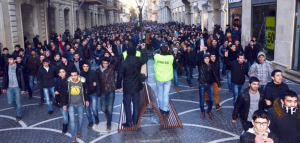 Political activism in Azerbaijan continues to search for ways of expressing itself in an environment that whilst not being totalitarian, leaves little space for the expression of dissent.
Political activism in Azerbaijan continues to search for ways of expressing itself in an environment that whilst not being totalitarian, leaves little space for the expression of dissent.
For many years street protests were the way that Azerbaijanis vented their political opinions. But opportunities for that have become increasingly limited, with the government restricting public demonstrations, and banning them completely from the centre of the capital, Baku.
Despite technical and financial problems, several anti-government newspapers continue to publish. Journalists report harassment of all forms, especially when reporting on corruption, but many remain undeterred.
In recent years many young activists have taken to cyberspace, where many young activists now blog regularly in Azerbaijani, English Russian and other languages, connecting not only with their own compatriots at home and abroad, but also internationally. The government has by and large tried to ignore this phenomena, using positive methods to counter it, largely by strengthening its own on-line presence.
Youth groups have become increasingly active and increasingly artistic in their methods. Increasing international attention has made the Azerbaijani government more sensitive to the way it handles dissent, and there are some signs that “soft policing” may be more in fashion now. Both sides however are testing the water.
On Saturday, 12 January a demonstration took place in the centre of Baku. There were many things about it that made it different from others. First it was issue based. The demonstrators were protesting against abuse in the Azerbaijani military which has seen a number of deaths of conscripts. This is a popular issue in Azerbaijani and one to which both young people and their families relate very closely. Second, it was not organised by the political parties, although certainly many opposition activists were present; third it was backed up by an online campaign, including a facebook page to which thousands signed up; fourthly it had a specific demand, the resignation of the Defence Minister.
There were other things that made the protest different. Unlike in other similar unsanctioned, i.e. illegal demonstrations in recent years, the numbers of those participating was large, maybe one or two thousand, and not just a few dozen. But what was even more striking was the fact that the police did not try to break it up, even though some incidents were reported as the demonstrators were dispersing, and several demonstrators were subsequently fined. This could have been the result of soft policing policies, or the fact that the issue was too sensitive for the government to be seen unconcerned by it. Probably it was a mixture of both.
Speaking on behalf of the ruling New Azerbaijan Party (YAP), Deputy Secretary, Mubariz Gurbanli said that Azerbaijani police demonstrated professionalism. He said that the protest was unauthorized but peaceful and the police treated the protesters calmly and professionally: Gurbanli noted that death of each Azerbaijani soldier “outside the regulations is condemned by everyone”, including the Governing Party and supported a full investigation of recent deaths in the army.
Politics in Azerbaijan is slowly evolving. Some think the process is too slow and that more radical action is going to be required for basic freedoms of expression to be secured. Others insist the country needs to move cautiously on the path of political reform. One thing is clear. Things are changing, and most seem to agree that this is for the best.
Source: CEW Staff report.